| The Beast of Terror
forms his strategies in the day and attacks the child at night in the
secrecy of the dark bedroom where he lurks under the bed, in the
closet, upon the shadows undulating against the pane of the bedroom
window. But for some children, the Beast of Terror has no
nocturnal solace, no playground to romp his wiles into the mind of a
child. Parents of Sleeping Vigilance stand guard next to
their children, protecting them from the Beast. Find out
how they do this. |
 VigilanceVoice VigilanceVoice

www.VigilanceVoice.com
Wednesday--January
15, 2003—Ground Zero Plus 490
___________________________________________________________
Sleeping With The Beast Of Terror Creates Dreams of Vigilance
___________________________________________________________
by
Cliff McKenzie
Editor, New York City Combat Correspondent News
|
GROUND ZERO, New York City, Jan. 15- The Beast
of Terror's domain is the dark. It rules most ferociously
at night, when the child's bedroom door is shut and the shadows of
the night dance unctuously over the mind of a vulnerable child,
reminding him or her that danger lurks just a shadow away.
 |
|
The Beast of
NightTerror is always hungry |
But there is a growing number of Parents of
Vigilance who are denying the Beast access to their children.
They are sleeping with the Beast of Terror, holding up Shields and
Swords of Vigilance to ward off the Beast's freedom to attack the
child in the nefarious night. They challenge the Beast's
right to own their child when the demons of the dark swallow the
light of security.
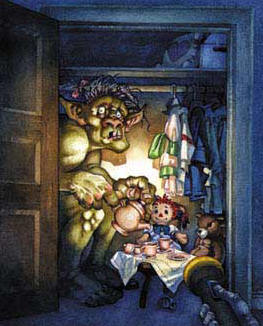 |
|
The Closet
Monster preys nightly |
According to a federal survey released this
past Monday (Jan. 13) by the National Institute of Child Health and
Human Development, children under 8 months old who slept
with their parents had more than doubled in the past seven years.
In 1993-94 the survey found that 5.8
percent of parents slept with their babies. The 1999-2000 report, which asked if their infants usually shared an adult bed,
jumped to 12.5 percent. When questioned if their babies
spent at least "some time" sleeping in an adult bed in the previous
two weeks the number soared to nearly 50 percent.
Jan Hunt, director of the Natural
Child Project (
www.naturalchild.com)
, lauded the study as an example
of closer bonding between parent and child. Experts suggest that
parents who sleep with their infant children create a deeper
psychological relationship with them, reducing the "generational gap"
that leads to misunderstanding, alienation and often child abuse.
 |
While the study noted there were vast
ethnic differences in the number of parents sleeping with children, the increase overall was
consistent. For example, black infants were four times as
likely as white infants to share an adult's bed. Asians and
Latin Americans were more prone to sleep with their children than
other ethnic groups, and
consider the idea of separate bedrooms for a child psychologically
harmful.
The study noted, however, that while
white adults ranked low regarding the numbers of parents of other
ethnic groups sleeping with their babies--4 percent in 1993-94 study--that
number of white parents more than doubled to 9.6 percent in the
1990's, sustaining a trend among all ethnic groups to seek closer
bonding with their infants.
Dr. James McKenna, head of the
Mother-Child Sleep Lab at the University of Notre Dame, advocates
mothers and babies sharing beds. He suggests the comfort
and closeness babies get from sleeping with their mothers makes them
"more independent and able to deal with stress better."
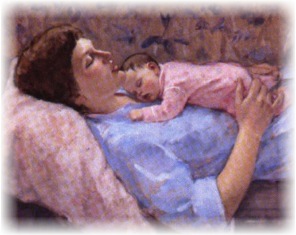 |
|
The comfort
and closeness babies get from sleeping with mothers help them deal
with stress later on |
While the study did not delve
into the psychological motivations of the parents, or the impact upon
a child of sharing a bed with his or her mother and/or father at night, other
studies show that bonding between mother and father with the child is
increased when the child shares the bed during early development.
One of the major factors
of sharing a parent's bed is enriching a child's psychological armor. When
babies sleep in separate rooms, the child is isolated, cleaved from parental security and left vulnerable to the night, researchers
say.
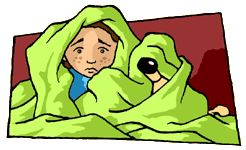 |
|
Waiting for
the attack by my Beasts of NightTerror |
As a Child of Terror, I slept
in a state of constant angst waiting for the Beast of Terror to
attack. In my case, my parents were constantly fighting
and arguing, and their Voices and invectives swirled under the cracks
in the door as poison gas might clog the air one breathes. Their
constant battles, usually induced by alcohol, stung and smarted my
sense of security. I lay rigid until the
fighting and bickering stopped, or fell asleep coiled like a spring,
ready to leap out of bed and run as fast as the wind to some unknown
sanctuary where I might find safety even though I knew there was none.
Thousands of other children suffer
similar tensions, many far worse than mine. A friend of mine
related to me the horror of waiting to hear her father open her
bedroom door so that her Beast of Terror could enter her personal
sanctuary and molest her night after night from age 7 to 14.
When the night fell, her world became a dark torture chamber.
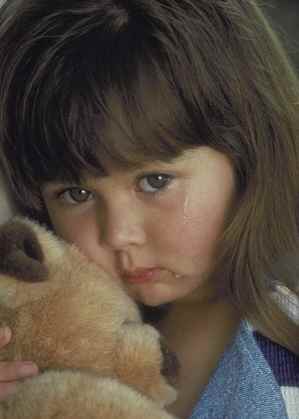 |
|
My friend's childhood
innocence and her power were devoured by her NightTerror
Beast = her father |
I can only relate my experience to
the emptiness of the bedroom, to the sense of being locked in a Cell of
Terror, waiting for the Beast to burst through the door. Today,
I vividly recall crawling deep
under my covers and hiding at the foot of the bed in hopes the
creature would mistake me for a lump of blankets and move on. In
my mind, I had no protection. My parents were the Beast's
disciples, at least in my child-Terrorized mind.
My wife's and my older daughter found
herself in our bed almost every morning until nearly six years old
wondering how she'd gotten there. Her unconscious quest for
comfort moved her to the warm, cozy and loving bed of her parents.
We encouraged her to find solace with us if she was ever frightened
and her door was always open.
Even without abusive parents,
children sleeping in darkened rooms with doors shut, are isolated from
the security of their mother's or father's protection.
Often bedrooms are used as "punishment cells," when parents say:
"Go To Your Room!" as though it were a dungeon, a cellblock commanded
by the "evil demons" who sneer and laugh and torture the mind of the
child remanded to the dark or loneliness of a room filled not with
love but with Terror.
I found the federal study revealing in many
ways. It suggested strongly that if a Parent of Vigilance seeks to build
a lasting Trust Bond with a child, then sharing the family bed was a
key to bridging any gap between the infant and adult.
Parenthood ultimately boils down to being the child's protector--not
only its physical protector, but its emotional one as well.
Infancy is the prime time when the child's psychological chemistry
is formed. The mind is most vulnerable in
this formulative period. Left unguarded and unprotected, it can easily
construct legions of Fears, Intimidations and Complacencies--the
Triads of Terrorism. Conversely, a child who is close to
the parents' protection and support, can be imprinted with the Trinity
of Vigilance--Courage, Conviction and Right Actions.
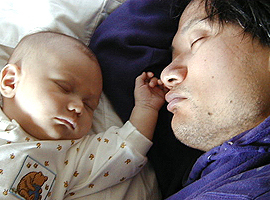 |
|
Vigilant Dad
starving the NightTerror Beast |
While these attributes
of Fear versus Courage, or Conviction versus Intimidation and
Complacency versus Right Actions may not be
cast in concrete in a baby's mind, the foundations for their growth are being
dug. Alone in a separate room a child is isolated and easy prey
for the Triads of Terrorism.
Children have feelings even though they haven't been fully formed, and
isolation is one that a baby intuitively recognizes.
That's why they cry--to be held, touched, to know the warmth of their
parents. They cry out of Fear, Fear of loneliness and
abandonment.
In World War II during the German
blitz of England, hundreds of orphan children were put under the care
of the state. The overcrowded conditions and understaffing
made it difficult for the caretakers to give adequate attention to the
babies on an equal basis.
A social researcher Dr. Rene Spitz,
documented studies of children who had been left homeless
and motherless and fatherless by the bombings. He noted that children in
cribs near the main traffic areas close to the nurses seemed the most active.
They were touched and held more because of the proximity of the health
care providers. They seemed to thrive despite the absence of
their parents.
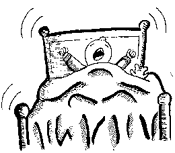 |
|
Child wrestling with the NightTerror Beast |
Conversely, children in the far back dark
corners of the room received the least contact. Many were
rarely held or attended other than feeding. Essentially,
they were isolated, disenfranchised from the flow of humanity.
Infant deaths among this group soared, according to Spitz.
He made the assumption that handling and touching an infant, and being
close to him or her, provided a life force. While children who
were denied that energy had little fuel to want to live, and often
just died for no reason other than lack of contact. Their "will
to live" was not fired. There was no "Vigilant" imprint.
Dr. Spitz is an advocate of "emotional
imprinting," and promotes that either the "dark" or "light" can be
embossed upon a child.
The recent Federal Survey regarding the
increase of U.S. parents sleeping with their children suggests a
trend toward more Vigilance between parents and children.
While there are no hard facts presented in the study that such
"bonding" is fruitful for the child, it doesn't take a rocket
scientist to figure out the difference between a child being left
alone in a dark room or cuddled next to its mother. One has a
far greater chance of integrating into society than the other, and
doing so without a wall of Fear, Intimidation and Complacency keeping
it from embracing the world's limitless opportunities.
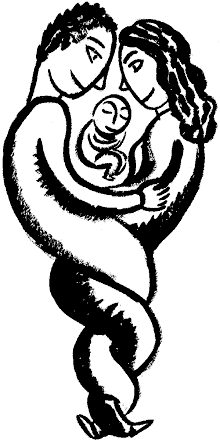 |
|
Parental
bonding with the child blossoms into vigilant family trust |
Vigilance
is about teaching a child Courage in the face of Fear,
Conviction when the shadow of Intimidation falls upon
them, and Right Actions when the quagmire of Complacency
sucks at his or her feet and tries to keep him or her
inactive or unresponsive. To keep a child
from the arms of the Beast of Terror takes an understanding
of loneliness and despair. If a parent thinks
about a child waking in a dark room, alone with only the
shadows of the night for comfort, it doesn't take much
imagination to see the power of sharing a bed with an
infant as a solution to protecting the child from the
Claws, Jaws and Claws of the Beast of Terror.
Bonding--imprinting
a love for a child in the formative months of its existence--can
only further solidify Vigilance between the two.
For millenniums,
humans and their children have slept together. It
is only in recent modern times that we have separated
ourselves from our children when they sleep.
Hopefully, we are heading back to the days when a child
and parent became one in the dark of the night.
If we are, then we are moving toward more Vigilance and
away from Terrorism.
The more we sleep
with our infants, the more we create trust and love with
them, the farther we drive the Beast of Terror away from
his playground--the dark, isolated room of a child.
Become a Parent
of Vigilance. Sleep with our infant rather
than let the Beast of Terror sleep with him or her.
And, if your child
is grown, invite your child for a sleep-over. Throw
a bunch of blankets on the floor of the living room or
den and enjoy a slumber party. It's never too late
to remind yourself or your child that you love them both
in the sunshine and the dark of life.

Jan. 14 -- Sending An SOS For
Vigilance--The Titanic Of Terrorism
©2001
- 2004, VigilanceVoice.com, All rights reserved -
a ((HYYPE))
design

|
|
|